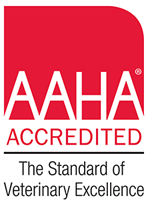
In 2016, owners spent over $28 billion in pet food according to the Pet Food Industry Company. In the US alone, there are well over 4,000 pet food products on the market. With the enormous volume of information online, reports of pet food recalls, and savvy marketing tactics, it’s almost impossible to weed thru the myths to understand what’s truly important regarding pet food choices. Taken from veterinary nutritionists, here is a summary of the common current myths & the actual reality.
MYTH: Grain-free diets are healthier.
Not necessarily. Grains can be an excellent source of energy, while also providing fiber. Properly processed grains can be 90% digestible. And, contrary to some advertising grains are unlikely to cause allergies (other protein sources like beef, dairy or fish are more likely).
MYTH: Wheat causes allergies in pets.
Food allergies typically constitute no more than 10% of the allergies we see in pets with flea allergies & allergies to things in the environment being much more common. Meat proteins (beef, fish) and dairy products more commonly cause food allergies in dogs & cats. See below for information on gluten.
MYTH: Corn causes allergies in pets & is only used as a cheap filler.
See above regarding allergies. The term “filler” is generally reserved for ingredients with little nutritional value, but corn can be a good source of carbohydrates, protein & fatty acids. Corn gluten meal is very digestible making its nutrients readily available. Corn can be found in many forms and with varying quality. There are 5 grades with 1 & 2 being suitable for human consumption. Therefore, if corn is used you do want to ensure it is a good quality.
MYTH: I should avoid gluten in my pet’s food.
Pets with celiac disease react to the protein (gluten) in wheat, rye & barley. This is extremely rare. Irish setters are primarily the only known breed known to have a genetic sensitivity to gluten, and even then it doesn’t affect all Irish setters. Corn gluten doesn’t cause GI problems and can be a good source of protein while being very digestible. Gluten also gives pet foods their shape.
MYTH: Animal digest is a low-quality ingredient.
The word digest doesn’t refer to contents of the GI tract, but rather the process used in production where animal protein is broken down or digested into smaller components resulting in a very concentrated, very palatable liquid, paste or powder. This can then be sprayed onto kibble to enhance its palatability. If the manufacturer uses good quality protein, the digest is hopefully good as well.
MYTH: It is better to provide my pet with food labelled as “natural”, “organic”, or “holistic”.
The term holistic is not defined by any regulatory body so its meaning varies dramatically depending on the company using it and the person interpreting it. Organic refers to a way a crop or animal is raised. Organic crops must be grown on land free from pesticides for at least 3 years, and organic livestock is fed organic grain, not given antibiotics or hormones and has access to outdoors. There are 4 levels of organic. In order to use the USDA seal, the food must have 95-100% of its ingredients be organic. Natural means the ingredients are from plant, animal or mined sources & haven’t been made by a chemical process. There are no additives that are synthetic either, but chemically derived vitamins & minerals are ok. Although it is commonplace to think that organic or natural foods are better to consume, it is important to understand the actual words being used and their meaning.
MYTH: Carbohydrates will make my pet fat & diabetic, while proteins are bad for senior pets.
Even cats, though considered carnivores, will obtain energy from carbohydrates. When consuming prey, because the prey often has carbohydrates in its digestive tract, wild cats do consume some carbs second hand. If carbohydrates aren’t included in a diet, the diet often has higher levels of fat which can lead to obesity. Though cats with diabetes do better with a high protein lower carb diet, eliminating carbs altogether prior to being diabetic will not prevent diabetes from developing at all. There is no evidence that high protein diets lead to kidney damage in pets. Older pets actually need pretty high levels of protein to maintain lean body mass as they don’t metabolize protein as easily as younger pets do. It’s the phosphorous found in most protein sources that must be controlled. Certain pets with liver disease may need low protein diets, but the majority of older pets don’t fall into this category.
MYTH: Raw diets are the best diets for cats & dogs since this is how their ancestors ate.
Although wild dogs & cats may eat raw food– they have no choice. We know that bones can fracture teeth, get stuck in a pet’s esophagus or intestines, and sharp edges can tear the digestive tract. Raw diets also contain harmful organisms like salmonella which may not only impact your pet, but the rest of your family too unless fastidious cleaning protocols are used in preparation. Raw food diets may be lacking in important nutrients, or in some instances can even have excess amounts of certain nutrients. We also know that some of the nutrients obtained eating raw in the wild actually come from eating the ingested material that the prey had consumed – typically grains, and/or fruits & vegetables. Ultimately, we stand with many other professional organizations who have deemed raw diets as potentially harmful & don’t see enough benefit to counteract the potential dangers.
So what should I feed my pet?
When choosing a pet food it is important to choose one that is complete and balanced to meet the requirements of whatever life stage your pet is in. It is important to choose one with the AAFCO seal, and ideally one that has gone thru feeding trials. Additionally, it is important to choose a product made by a company that’s been around for a while, is large enough to hire experts in nutrition, and is readily available to answer questions about their product. If you have questions, ask your veterinarian. Even if he/she isn’t familiar with all foods they can at least guide you to brands/products that are appropriate. (Please note there is a certain population of pets with nutrient sensitive disorders such as diagnosed food allergies or organ dysfunction that will do better on a prescription diet recommended by your veterinarian.)
Are there any website you recommend for more information?
The following websites are reputable & publish excellent information regarding pet nutrition.
American Academy of Veterinary Nutrition - http://www.aavn.org
World Small Animal Veterinary Association -http://wsava.org
The Pet Nutrition Alliance -http://petnutritionalliance.org
Tufts College of Veterinary Medicine -http://vetnutrition.tufts.edu/

